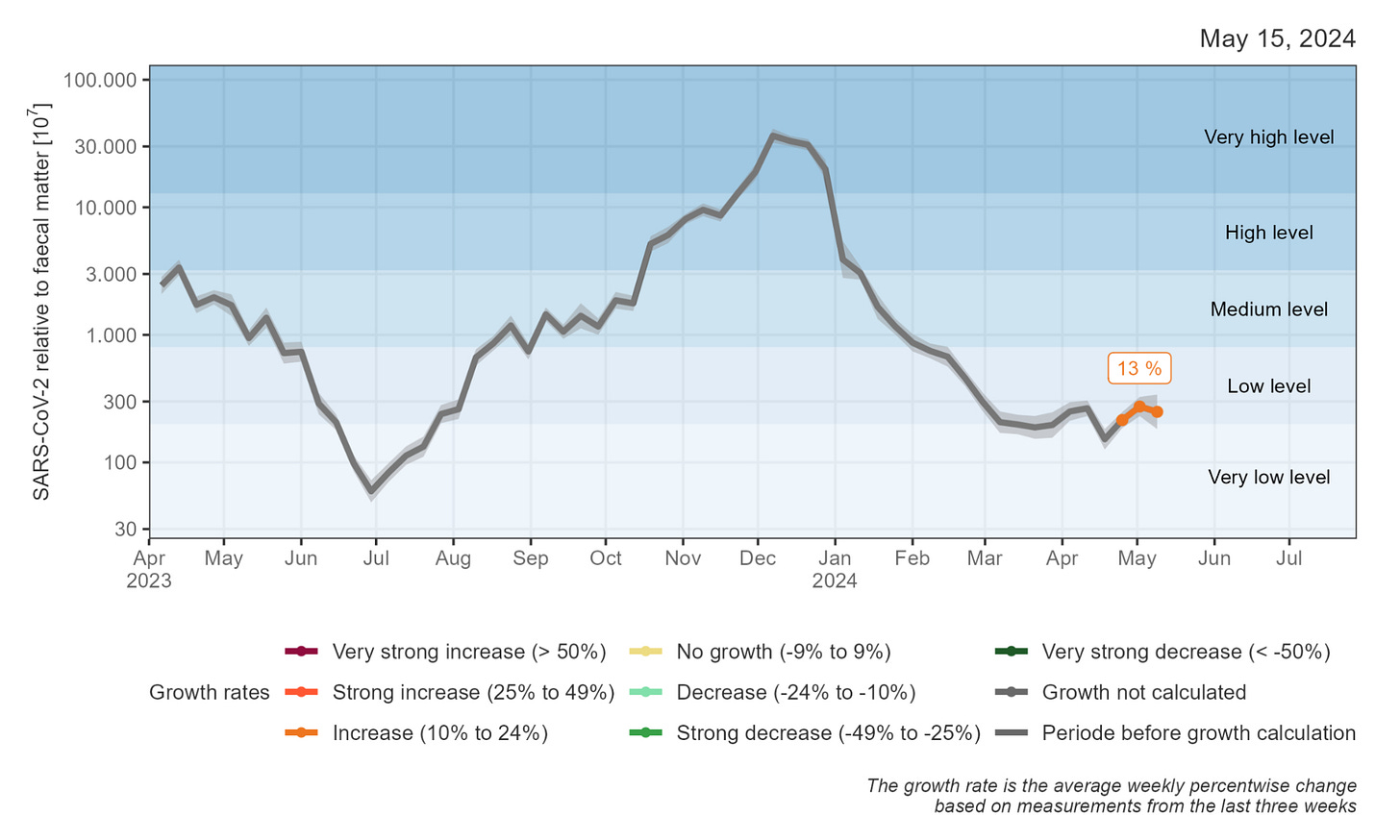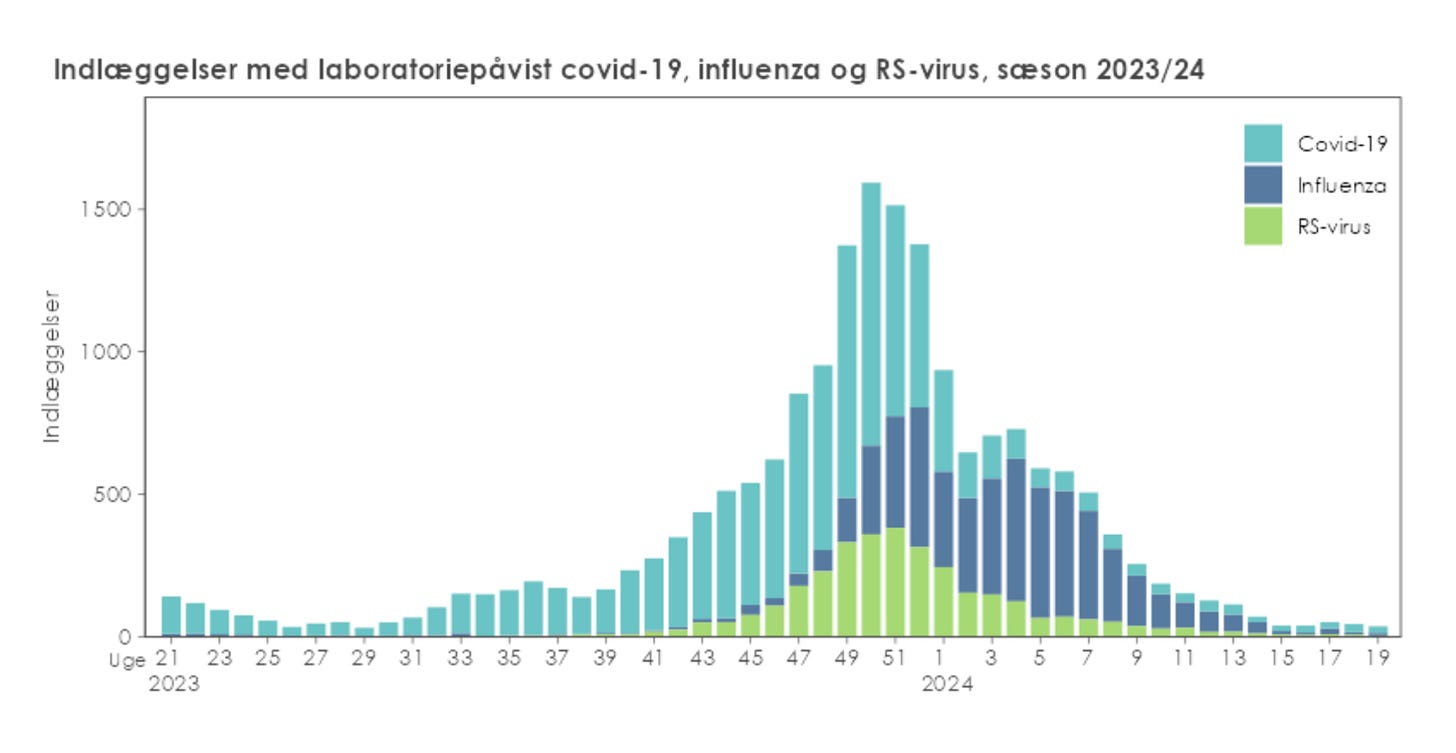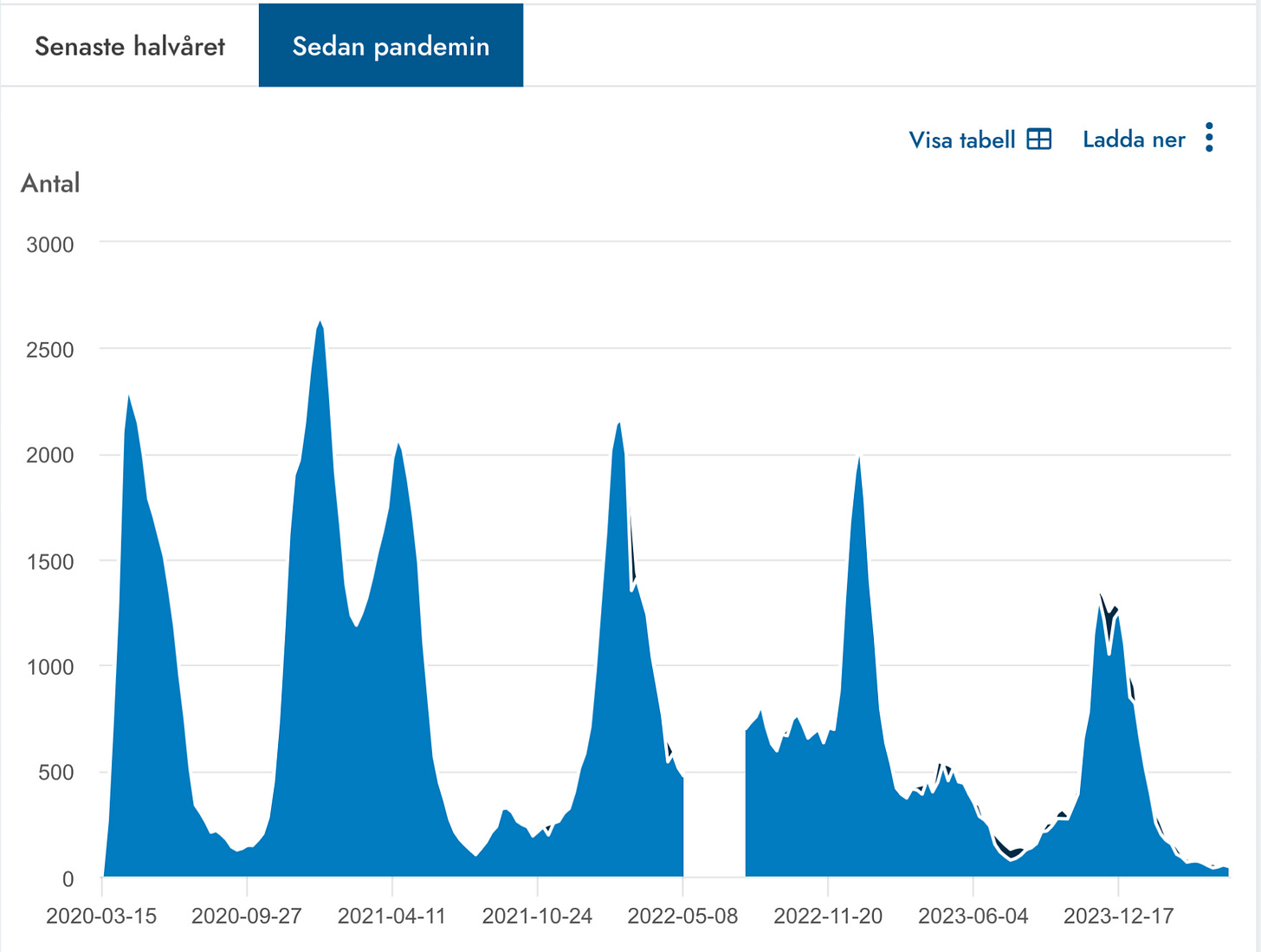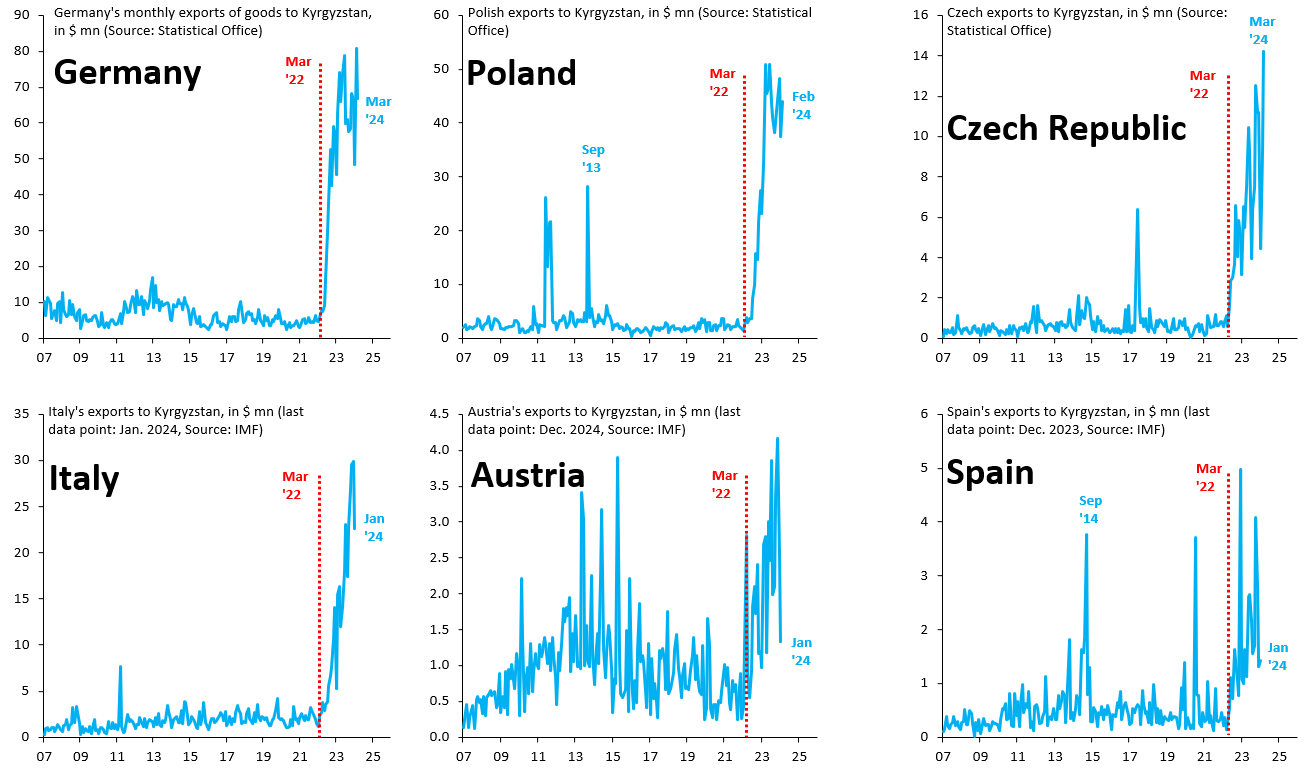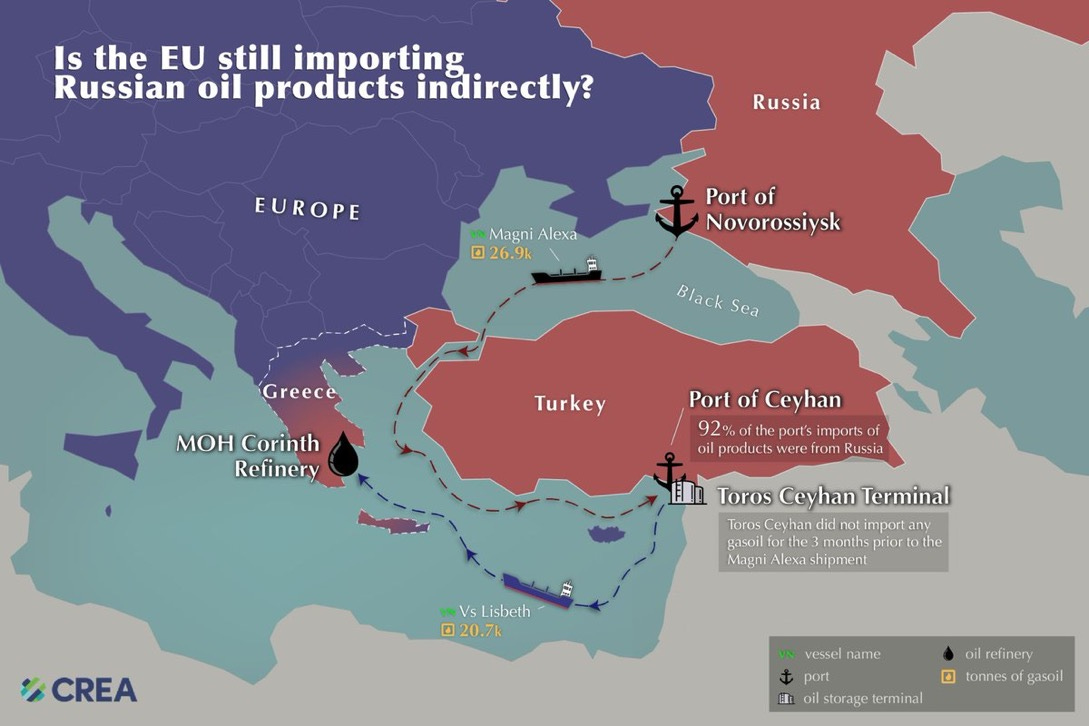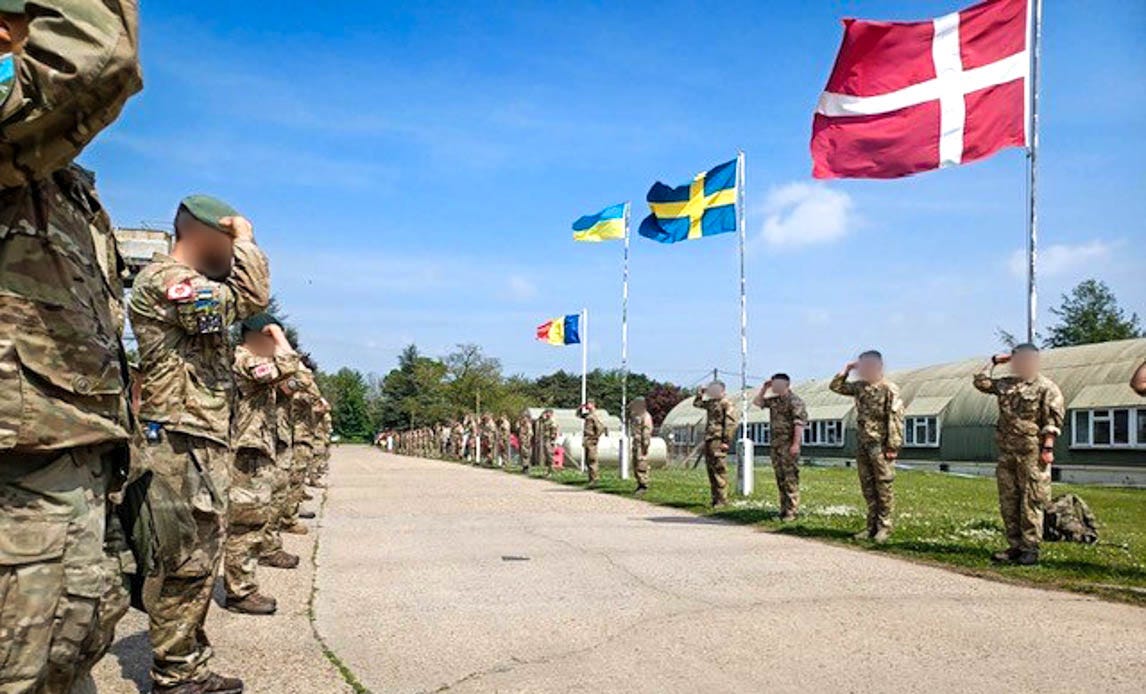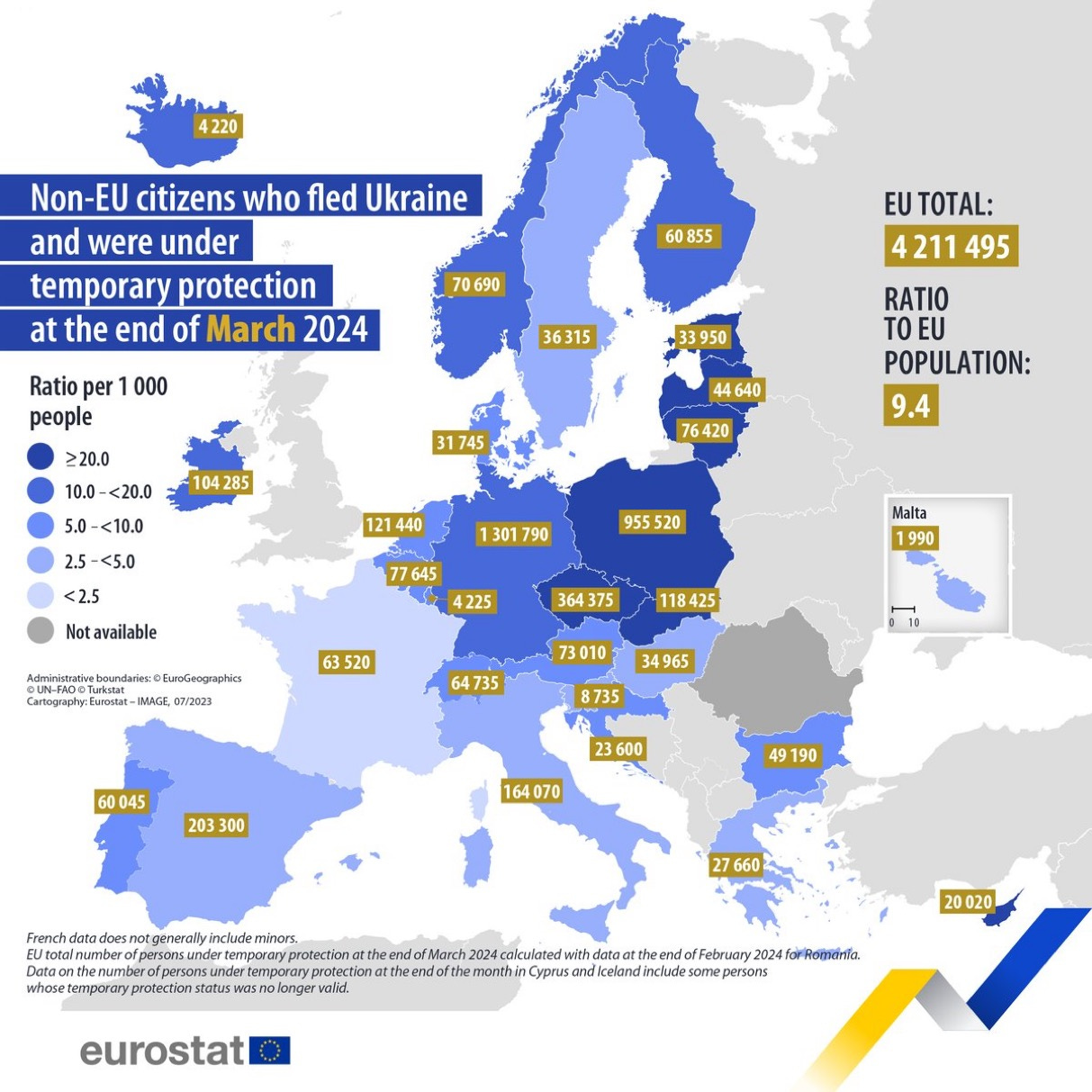The Evening Report - May 16
As temperatures rise so do river levels. Russia hybrid threat worries.
🍃Environment & Energy⚡️
🌍
The world’s coral reefs, a vital foundation of the planet’s marine ecosystems, are in crisis. The National Oceanic and Atmospheric Administration now says that 60.5% of the world’s coral reefs have been bleached white due to record high water temperatures, and that number is increasing. Bleached coral is not necessarily dead, but it makes it much more vulnerable to dying off.
Coral reefs are home to millions of fish species, making them a vital part of the ocean’s food chain and a vital contributor to marine biodiversity. Reefs also help reduce wave impacts, protecting coastlines. Over half a billion people around the world also depend on reefs for food, income, and protection.
🇩🇰 ☀️
Denmark has had its first official summer day. Temperatures rose to just over 25 degrees in Stauning in West Jutland, on Wednesday. But while May sizzles and June could see the warm trend continue, the usual Danish weather will reintroduce itself in July and August. According to the Danish Meteorological Institute, its first long range weather forecasts indicate unstable rainy weather in July and parts of August before things warm back up again.
Weather forecasts are inherently shaky things, so take these first blush forecasts with a grain of salt. Usually, average temperature highs in July hover around 21 degrees with an average monthly rainfall of 65.8 millimeters. August averages high temperatures are also around 21 degrees, but we usually see more rain, with an average of 82.1 millimeters coming down.
🇸🇪
The Swedish weather agency has issued a yellow alert for large swaths of Norrebotten due to high water flows resulting from soaring temperatures and rapid snow melt. The agency says the flooding risk is high. The flooding alert also covers Jämtland, Västernorrland, and the eastern parts of Västerbotten.
Along with the concern about rivers and streams spilling their banks, the suddenly very warm temperatures have also prompted the weather agency to warn people to guard against wildfires. SMHI has issued a grass fire warning for Värmland, Dalarna, Gävleborg, Västernorrland, Västerbotten, and Norrbotten.
In just a few weeks, large parts of Sweden have gone from freezing temperatures to summer-like weather. The thermometer rose above 20 degrees this week in parts of the country.
-
People in Sweden suffering from pollen allergies are having a miserable spring. High temperatures have resulted in an explosion of pollen in the air. There are high levels of birch pollen all over the country, but it is especially intense in Sweden’s north. Oak pollen will soon follow suit, as will grass pollen. Swedish health agencies are warning that the next few weeks will be difficult for those who are allergic to pollen.
Usually, birch pollen seasons are cyclical, high seasons are followed by a low season. In Sweden, this was supposed to be an off year. However, the sudden arrival of scorching spring temperatures has resulted in several days of highly concentrated birch pollen levels.
People who are allergic are advised to air out the house early in the morning or late at night. They shouldn’t hang laundry or bedding outside during the day. Keep windows closed during the day. Pets should also be kept inside. It is best to go outside only early in the mornings when the morning dew keeps the pollen levels down.
🇫🇮
The summer heat has also arrived in Finland. The thermometer reached as high as 27 degrees in parts of the country on Thursday. The transition from cold temperatures to suddenly basking in summer heat has increased the flooding risk, especially in snowy Lapland. Officials there expect rivers in Northern Finland to hit flood peaks by as early as today or by early next week.
🇪🇺🇩🇰
The European Union has moved to vastly reduce the use of plastic by 2030. Included in the initiative is a ban on using plastic to wrap unprocessed fresh fruit and vegetables. Currently, a number of fruits and vegetables in Danish grocery stores are either wrapped in plastic or come in plastic bags. The law does exempt some goods that can suffer damage from not being wrapped in plastic.
However, experts say the move will just lead to a lot more food waste. Aarhus University Department of Food Professor Merete Edelenbos says some foods need to be wrapped to ensure they remain fresh. She points to things like lettuce and scallions that quickly become dry or rotten if not wrapped in plastic.
The head of the Danish Center Institute of Technology, Lars Germann, agrees:
“Once you have produced food, you can make sure that it actually ends up as food, not as food waste. You do that by packaging it correctly. But the environmental impact you get from using less plastic can be completely out of control by having more food waste.”
According to the Danish Food Administration, 247,000 tonnes of food is thrown away per household per year. That accounts for 30% of the total food waste across the country. The EU's statistics agency, Eurostat, estimates that across Europe, 188.7 kilos of packaging waste is produced per inhabitant in 2021. This was an increase of 10.8 kilos compared to the previous year. And almost 32 kilos more than in 2011.
The EU will also ban plastic packaging for food and drinks served and eaten in cafes and restaurants. Plastic packaging for individual items like spices, sauces, and sugar. The ban also extends to packaging for things like toiletries used in hotels.
🇩🇰
The climate benefits of eel grass are being called into question. In 2022, Tänketanken Hav (The Sea Think Tank) published a study claiming that if eel grass was planted in large swaths of the sea bottom around Denmark, it could absorb and store 47 million tonnes of CO2 emissions. That is more than the total emissions Denmark produces in a year. However, those findings are being challenged. Researchers at Aarhus University have released a new report calling the climate benefits of eel grass “a myth and a misunderstanding.”
Professor and Microbiologist Bo Barker Jørgensen is one of 27 researchers who published the report:
“Calculations indicate that the amount of CO2 that can be captured by the eelgrass and stored on the seabed is a few thousandths of what we emit each year.”
Tänketanken Hav Program Manager Søren Laurentius Nielsen stands by the findings of his agency’s report, despite the findings from Aarhus University.
“We don't come up with numbers ourselves. Everything in the analysis is based on research results and research literature. And now it's really exciting that there is a group of researchers who say, we have looked at things, and we have new figures.”
Nielsen adds that they will go over the data from Aarhus University and, if need be revise their own analysis.
The disagreement comes amid a national effort to restore eel grass in the ocean waters around Denmark. In fact, on June 8, the first ever ‘Planting Day’ will be held, where volunteers can meet at 32 locations around the country to help plant eel grass. Its climate benefits aside, eel grass is a crucial component of marine biodiversity, which is under massive threat due to critically low oxygen levels in the Baltic and in the Kattegat Strait.
-
It appears the carrot is a failure, but will the Danish government use the stick? Farmers in Denmark have been offered voluntary avenues for reducing nitrogen seepage from agricultural fertilizers into waterways. The leakage of nitrogen from fertilizers is the main cause of catastrophic levels of oxygen depletion in Denmark’s inland waters.
In 2021, the Danish government heralded voluntary agreements that it said would bring farmers onboard and reduce nitrogen emissions by 1,500 tonnes by 2027. Three years later, the Danish Environmental Protection Agency says that voluntary agreements reached so far equal a reduction of just 154 tonnes of nitrogen emissions, miles away from the goal.
DTU Aqua Coastal Ecology Professor Karen Timmermann:
“It is completely unrealistic to achieve at the current pace. As a tool for achieving nitrogen reductions, the voluntary agreements have not worked. This has also been seen in the past with other measures based on volunteering.”
She says it is now up to the government to take decisive action.
“Ultimately, it is a matter of political will. You pretty much know what it takes, and it seems you have for a long time. It's a matter of doing it.”
Last year, researchers recorded the biggest loss of oxygen in Danish waters in more than 20 years.
-
That is all she wrote for the 141 year old fishing association on the Danish island of Bornholm. The few remaining commercial fishermen disbanded the organization this week. This is after several years with extremely poor catches, zero quotas for cod, rising sea temperatures in the Baltic, and a sea that is suffering catastrophic oxygen loss.
The association said that after a few disastrous years and a membership that has been reduced to just a few people, there was simply no more basis for keeping the association running.
-
People looking to take a dip in Sønderborg’s harbour will soon be able to jump in the water again. The city closed swimming areas along its waterfront earlier this week for the second time in less than three months due to oil pollution. The city closed swimming areas when an oily film was noticed on the water. The city says it is probably coming from a ship in the nearby port. Crews are investigating, and oil spill barriers have been deployed.
-
Denmark’s King Frederik X is hailing quantum computing as a way to help achieve climate goals. The royal couple is on a sailing tour, and during a stop in Norway, they were on hand to see an agreement being signed between the University of Oslo and the Danish Niels Bohr Institute. The agreement will see the two cooperate on quantum technology research, which will include employee exchanges and the sharing of research.
At a gala dinner afterward, King Frederik said that technological progress is key to fighting climate change.
“Quantum technology is a superpower when it comes to the development within the green transition, the development of medicine, defense, and security. Our opportunity to succeed increases when the best from both our countries is brought into play in the laboratories.”
🇩🇰 ⚡️
Overhead power lines are a rarity in Denmark, but they will become a little more common, at least on the country’s west coast, over the next few years. Energinet says that in order to facilitate the green transition with a major increase in offshore wind energy production from the North Sea and an increase in solar farms, more high voltage lines are needed. The agency says that over the next five or so years, 2,700 kilometers of high-voltage lines will be installed.
Energinet will have to submit its plans to build and string the power lines, which will go for public consultation before any final decisions on the final routes are made.
🇸🇪 ⚡️
The green energy transition is running smack into the growing of greens as a tug of war over land is shaping up in Sweden. Radio Sweden has its hands on documents suggesting that rich farmland in Region Skåne will have to be used for solar power parks. The document comes from the local County Administrative Board, which says if the green energy transition is to be successful, then solar power parks will have to take over otherwise rich farmland in southern Sweden.
This appears to be a change of position for the board, which has previously rejected proposed solar power park projects on agricultural land in the Skåne region.
The move will also likely spark heated debate.
🇫🇮 ⚡️
Finland’s powerful grid got an injection of electricity on Thursday as the country’s largest nuclear reactor plugged back into the system after being offline for 74 days. Scheduled annual maintenance took the Olkiluoto 3 offline and then dragged on a month longer than expected. That caused electricity prices in Finland to surge. The plant operator blamed technical problems, and it took longer than expected to shut the reactor down to do the work.
Olkiluoto 3 accounts for about 14% of Finland’s total electricity production.
🦠Outbreaks🦠
🇩🇰🇬🇧
A recall of ground meat linked to a salmonella outbreak has expanded in Denmark. Hilton Foods branded ground beef sold in Dagli'Brugsen, SuperBrugsen, 365 Discount, Coop, Irma, and Kvickly, is being recalled by Hilton Foods. The Danish Veterinary and Food Administration is now advising that Hilton Foods ground beef with a best before date between March 11 and May 13 should also be thrown away.
Last week, Hilton Foods meat imported from the UK with a best before date of March 26 to 30 and May 11 and 12 was recalled. Since mid-March, at least 51 people in Denmark have been infected with salmonella.
🇩🇰
From what it can tell through an increasingly narrow window, the Statens Serum Institute assesses that coronavirus activity, as detected via wastewater surveillance, remains “at a low level.” However, the SSI says if you zoom out and look at the trends over a three week period, then virus activity is increasing.
“When the concentration is low and there are few infected individuals, fluctuations in concentration are expected and may reflect a small change in the number of infected individuals.”
With the influenza and RS virus seasons over, COVID-related hospitalizations have taken over among the big three respiratory viruses, albeit with total admissions remaining very low.
-
The latest bivalent COVID vaccine used in last spring’s vaccination campaign across Denmark was not as effective against new coronavirus strains that popped up over the winter months. That is according to a new study from the Statens Serum Institute. The study included 3,862 seniors over the age of 65 who tested positive for a COVID infection between October and December of last year.
Epidemiologist, and study lead, Christian Holm Hansen:
“In the study, we observed that the new variants BA.2.86 and JN.1 were less sensitive to vaccine-induced protection, but we found no evidence that the variants produced more severe disease infections or symptoms. It is important to note that although the vaccine was less effective against these new variants, it still protects and reduces the risk of infection.”
Researchers estimate in the study that the BA.2.86 strain knocked down protections against severe infection, resulting in hospitalization from 75% to 64%.
“This could indicate that the reason why the omicron BA.2.86 variants are so successful in spreading despite the relatively high vaccination coverage may be that the population's immunity is increasingly derived from infection with or vaccination against previous variants such as XBB.”
🇸🇪
In Sweden, COVID hospitalizations (53) continue to ease (-10) while the number of severe cases needing intensive care (10) has increased (+9).
-
The Swedish Public Health Agency says that while overall COVID vaccination uptake is very high, there are some worrying trends. The agency says a “high proportion” of seniors over 65 and over 79% of those over 80 took advantage of last fall’s booster dose. While it hails uptake as being “among the highest in Europe” the agency is also noting that at the regional level there are some concerning disparities.
Vaccination coverage among seniors varied from 80% in some regions to barely 65% in others. Parse it down to the municipal level, and the variant ions are also quite striking.
Unit Manager Sören Andersson:
“We see that broad dissemination of information and high accessibility to vaccination are central to having a good impact, as well as effective cooperation between regions and municipalities. Vaccination coverage is also affected by socio-economic conditions, where personal invitations to vaccination have been a successful way to reach more people.”
While the health authority says that vaccination coverage is low in many regions, it puts the onus on improving inoculation rates on the regional health authorities.
Sweden is currently administering a spring COVID booster dose campaign, the only Nordic country to do so.
🇬🇧
In a study published last week in BMC Infectious Diseases, researchers from the UK Health Security Agency in London unveiled compelling evidence showcasing the efficacy of COVID restrictions implemented in UK hospitals during the first two years of the pandemic. The study suggests that measures such as COVID testing upon admission, isolation of symptomatic healthcare workers, and universal masking, significantly curtailed the transmission of coronavirus infections among both patients and staff.
Researchers dug into the impact of various mitigation strategies used during the pandemic. Their simulations, drawing from national and local data as well as expert opinion, revealed that COVID restrictions cut the number of potential infections and resulting hospitalizations and deaths by half. The study estimates that COVID restrictions in UK hospitals prevented 400,000 inpatient infections and 410,000 healthcare worker infections.
“Testing and cohorting of patients and isolation of healthcare workers were the most important interventions for reducing transmission to patients and healthcare workers, preventing up to 40% of infections. We also identified a significant role for masking, with universal masking being more impactful than masking around patients alone.”
These findings carry profound implications, emphasizing the critical need for strict compliance with infection prevention protocols as hospitals brace for potential future pandemics, not to mention the ever evolving COVID situation.
🇺🇸
COVID vaccines drastically reduced virus-related deaths in the United States alone, according to a groundbreaking new study by scientists at the Center for Disease Control and Prevention. The CDC study revealed stark realities about COVID mortality rates before the advent of vaccines. The study, published in Emerging Infectious Diseases, delves into pre-vaccine data from May 1, 2020, to December 1, 2020, offering a comprehensive picture of the pandemic's death toll. Shockingly, the analysis reveals that 18% of hospitalized patients and a staggering 44% of those admitted to an intensive care unit (ICU) succumbed to the virus, highlighting the severe impact it had on different demographic groups.
The study's scope is extensive, encompassing data from 2,479,423 cases for hospitalization and 4,708,444 cases for mortality across 21 and 22 jurisdictions, respectively. Astonishingly, these datasets represent a significant portion of the US population. Before vaccines became widely available in mid-December 2020, the pandemic had already caused approximately 480,000 hospitalizations and claimed 350,000 lives in the United States alone.
The analysis reveals the pandemic's disproportionate effects across demographics. Age emerges as the most significant predictor of mortality, with rates peaking among older age groups. Notably, ICU mortality rates stood at nearly 50% early in the pandemic. The study's authors emphasize the necessity of these findings as a baseline for future comparisons.
🇺🇦Ukraine/ Russia War🇷🇺
Russian forces have been making gains in the Kharkiv region of Ukraine, suffering huge losses to advance. However, military experts note that the advance has slowed in the last few days and that the territory taken has been lightly defended. NATO’s European Commander Christopher Cavoli is adding to the speculation that the Russian offensive is sputtering to a halt by saying that it simply doesn’t have enough soldiers in that part of the battlefield to achieve its objectives. And what soldiers are there are now seriously depleted, with thousands killed in order to make what amounted to small advances. He is convinced that Ukraine will hold its own in the region.
Kharkiv is Ukraine's second largest city and is just 30 kilometers from the Russian border. Russia has deployed 30,000 troops in a major offensive that has so far resulted in capturing some villages while suffering losses of almost 30% of its ground forces.
🇩🇰🇸🇪🇫🇮🇳🇴🇮🇸🇫🇴🇩🇪/ 🇷🇺
The threat of so-called hybrid attacks from Russia and the overall security situation topped the agenda when the prime ministers of the six Nordic nations and Germany met in Stockholm this week.
Danish Prime Minister Mette Frederiksen says one of the major focuses of Russia’s hybrid warfare tactics is the European Parliamentary elections that will take place this summer.
“Russia basically wants to destabilize our society. That is why I also think that people need to be very aware of what they read and see on social media, and I think that the European Parliament elections will be the first time that we see widespread attempts by Russia to simply destroy our democracy.”
Major Alexander Høgsberg Tetzlaff, a military analyst at the University of Copenhagen’s Center for Military Studies, says that the risk of hybrid warfare from Russia has become greater.
“If you stood on the battlefield, the Russians would not be able to hold up much against NATO's total military strength, and therefore there are many who speculate that Russia will use other tactics, including hybrid means, to compensate for the fact that they are not equal to so strong a military.”
A hybrid attack can mean anything from actual sabotage, to cyber attacks, the spreading of disinformation, the weaponization of energy exports, or illegal migration. Intelligence agencies in all the Nordic countries have recently warned of an increasing threat of Russian sabotage and espionage efforts. NATO has also expressed concern recently, saying that Russia is engaging in hybrid warfare across Europe, with countries like Great Britain, Lithuania, Poland, the Czech Republic, Estonia, Latvia, and Germany all being affected.
🇩🇰🇸🇪/ 🇷🇺
Life comes at you fast. At the beginning of the year, Denmark’s Defense Minister, Troels Lund Poulsen, played down the Swedish government’s efforts to prepare the population for war, calling it “very dramatic.” Now he has changed his tune.
“We must get better at explaining to the Danish population how to behave if this happens.”
Just over a week ago the Danish Police Intelligence Service and the Defense Intelligence Service declared in unison that there is a much greater threat of Russian hybrid war tactics in Denmark.
Poulsen warns that society shouldn’t just be prepared for a physical war but also for hybrid war efforts by Russia that could, for example, knock out the power grid for a long period of time, impact drinking water supplies, or take the internet offline. He says the Danish government must do a better job at preparing the population for efforts aimed at destabilizing Danish society.
“I would like to emphasize that there is a need for more direct information to citizens and businesses about the challenges we are facing.”
In Sweden, a government pamphlet advising people on how they can prepare for the eventuality of war will be sent to every household in the country next month. The last one was distributed across Sweden in 2018. Poulsen will meet with the Swedish Minister for Civil Defense, Carl-Oskar Bohlin, to talk about the Swedish efforts and what Denmark can learn from them. In the Danish parliament, negotiations are taking place on strengthening Danish crisis preparedness.
🇪🇺🇺🇦/ 🇷🇺
Despite a mass of sanctions, goods continue to find their way from Europe to Russia, just as much as Russian oil and gas continue to flow into the EU. The Brookings Institute is highlighting how Kyrgyzstan has become the middle man in facilitating the flow of European goods to Russian markets, helping to sustain the war in Ukraine.
Senior Fellow at the Brookings Institute Robin Brooks:
“There's now 13 EU sanctions packages on Russia, and this is the reality. Russia's invasion of Ukraine has shone a light on how the EU works, and it's bad. The EU doesn't need grand visions for the future. It needs people who make it transparent and accountable in the here and now.”
The Centre for Research on Energy and Clean Air has found that marine trade in Russian oil and gas flows into Europe from Turkish ports importing oil and gas from Russia. The centre says that since the European Union and the G7 banned Russian oil and gas, Turkey has seen a 105% increase in imported oil and gas from Russia. In the same time period, EU oil and gas imports from Turkey have increased by 107% year over year. The CREA calculates that this has resulted in tax revenues worth €5.4 billion flowing into Russian coffers.
The centre is urging the European Union to toughen sanctions by clearly defining that member countries cannot import re-exported Russian oil and gas. It would also like to see oil products certified to include country of origin and, if necessary, use chemical testing on oil imports from Turkey to determine their origin.
🇩🇰🇺🇦
Denmark is sending its 18th weapons package to Ukraine. Valued at 5.6 billion Danish kroner (about $1.1 billion Cdn) half is dedicated to air defenses, with a heavy focus on procuring more Patriot missile batteries. Funds will also be used to buy artillery ammunition, grenades, and anti-tank mines. Money has also been set aside for the maintenance of previously donated weapon systems, to continue to build out Ukraine’s own defense industry, and for the imminent donation of F-16 fighter jets.
Defense Minister Troels Lund Poulsen:
“The situation in Ukraine is very serious. There is no doubt that the Ukrainians need continued support, and a lot of it from allies. With this package, we are sending an unequivocal signal to both Ukraine and the outside world. We are delivering both donations now, and we are ready to invest massively and long-term in the Ukrainian defense industry. Their fight for freedom is still our fight.”
Foreign Affairs Minister Lars Løkke Rasmussen:
“With today's donation, we meet Ukraine's urgent need for more air defense, artillery, and ammunition. As part of the package, the government is also setting aside additional funds to be invested directly in the Ukrainian defense industry. It makes sense to produce the weapons where they are used and by those who use them. It is also about future-proofing Ukraine's defense capability. Ukraine has the skills, but lacks the funding. Hopefully more countries can be inspired to follow this model.”
-
Another batch of Ukrainian recruits finished their training under the watchful eye of Danish instructors this week. The Danish Armed Forces said that it was an emotional week for both the Ukrainians and the Danish instructors doing the training. The Ukrainians went through a medal ceremony and then departed by bus, passing rows of saluting Danish soldiers as they prepared to return to the front lines.
Denmark, and other allied countries, are busy offering highly condensed five week basic training programs for Ukrainian soldiers. Denmark is also training Ukrainian pilots on F-16s and helping train Ukrainian crews on the operation and maintenance of Leopard battle tanks in Germany.
🇸🇪
Sweden has opened the door to NATO placing nuclear weapons on Swedish soil, but only during a war should the need arise.
Swedish Prime Minister Ulf Kristersson spoke to Sveriges Radio:
“In a war situation, it is a completely different matter. Should the very worst happen, democratic countries in our part of the world must, of course, defend themselves against countries that threaten with nuclear weapons.”
Kristersson emphasized that the Swedish government retains the right to make any final decisions, adding that this is concrete no matter how some people may choose to try and spread misinformation.
🇷🇺/ 🇫🇮
Russian authorities have begun to report on detaining migrants near the country’s borders. This is a major shift from its tactics of weaponizing immigrants and funneling them to the Finnish or Polish borders.
University of Helsinki Russia Expert Hanna Smith says the Moscow concert hall terror attack has forced Russia to change gears, or at least give that impression.
“When the perpetrators' Tajik links came to light, Russia could no longer use the narrative that it is open to foreigners and cannot control movement through its territory. It would have made Russia look weak and lacking in control. From the perspective of the Russian government, it would seem odd if anyone could pass through the country at the same time as Moscow is tightening laws on emigration.”
Finland temporarily closed its land border with Russia last winter and then made the closure indefinite in February. Since August of last year, a wave of 1,319 illegal immigrants arrived at Finnish border crossings before they closed.
🇫🇮
The City of Helsinki has suffered a major data breach. An as yet unidentified hacker or hackers took advantage of a security vulnerability to access the data via a remote server. The breach includes the personal information of about 38,000 city workers, some 80,000 students, and their patients or guardians, along with tens of millions of documents.
The data includes some potentially sensitive information, including students’ school situations, special support requirements, medical reports, and information about teaching staff.
Helsinki's Education Division Executive Director Satu Järvenkallas:
"The amount of information that needs to be clarified is huge. Unfortunately, we cannot yet assess with certainty which information reached the perpetrator of the data breach. However, we will now tell you what risks exist so that the customers and staff of education and training services can prepare for the situation. This is the method of operation in accordance with [Finland's] data protection legislation.”
Frustratingly, there was a security patch to prevent just such an intrusion, but for some reason it had not been installed. Helsinki Police are now investigating.
🇱🇻/ 🇷🇺
Latvia is joining France in publicly raising the idea of sending troops into Ukraine. Latvian Defense Minister Andris Sprūds said it would get serious consideration if it happened as a collective effort with other European nations.
“First of all, we must look at what is most important to the Ukrainians. If it comes to sending instructors or soldiers, the collective approach is the best. If it turns out that way, we will seriously consider it.”
Sprūds notes that sending troops to Ukraine would be a risk considering his country shares a border with Russia on the east and Belarus on the south. This is where he feels NATO’s Article 5 would deter Russia from trying to take advantage.
“Where we see Russia, we see destructive activity and violations of international norms. Therefore, we are all threatened. But we are in the same alliance, it is one for all and all for one. No country is safer than others.”
🇺🇦🇪🇺
According to European Union statistics agency EuroStat as of the end of March there were 4.2 million Ukrainians under temporary protections across the 27 EU member countries.
Most, about 1.3 million Ukrainians (30.9%), are in Germany, with Poland sheltering almost one million Ukrainians (22.7%), and the Czech Republic rounds out the top three with just over 364,000 Ukrainian refugees (9.7%).
🇺🇦🇪🇺🇩🇰
As of Saturday, Ukrainian men living abroad who are of military age, between 18 and 60 years old, and who haven’t updated their information with the Ukrainian military will effectively be criminals. Ukraine has already suspended the right to consular assistance and things like passport renewal for men of fighting age who live outside the country. Now new measures will come into force this weekend. Those who don’t comply face the possibility of a hefty fine on top of being deprived of things like the ability to renew their Ukrainian passport.
EuroStat estimates that there are about 800,000 Ukrainian men of military age living in the European Union.
University of Southern Denmark Postdoctoral Fellow at the Center for War Studies, Sofie Rose, believes the Ukrainian government is going about this all wrong. She is working on a project on the subject and thinks that what Ukraine is doing is driving combat capable Ukrainian men away.
“The more rights they are deprived of, the more the motivation falls for many of them. Several have spoken about how they feel they are being distanced from Ukraine. Some talk about how they no longer want to return home.”
She says there needs to be a clear demobilization plan with guidelines for how long soldiers must serve and when they can take a break from combat. Rose also thinks that the recent headline grabbing stories about Ukraine’s struggles with not having enough weapons and ammunition are also having a chilling effect.
The Ukrainian government is desperately trying to increase the number of its soldiers as Russia continues to just throw away tens of thousands of lives for incremental battlefield gains in a bloody war of attrition. Estimates have the number of Russian soldiers killed in Ukraine to be approaching 500,000.
🇺🇸🇺🇦
Weapons and ammunition are flowing rapidly from the United States to Ukraine after a long pause where MAGA Republicans held up military aid for six months. The U.S. has announced another two billion dollars in military aid for Ukraine this week. US Secretary of State Antony Blinken, who was in Ukraine this week, says American efforts are focused on getting armoured vehicles, missiles, and air defense systems to Ukrainian forces as fast as possible.
🇺🇸/ 🇷🇺🇰🇵
The United States has levied more sanctions against Russia in an attempt to disrupt the flow of weapons, specifically missiles, from North Korea to the Russian military. Lately, North Korean missiles have been showing up in the barrage of missile attacks Russia is sending into Ukraine.
Odds & Ends
🇩🇰
A wild beaver was found in Nykøbing Falster on Lolland last weekend. Danish national broadcaster DR claims it is the first wild beaver to immigrate to Denmark in 2,500 years, which is an insane claim to make with any accuracy. The Danish Environmental Protection Agency believes the beaver swam over from Northern Germany, a swim of some 35 to 40 kilometers. The beaver was captured by animal protection officers after acting aggressively toward some children. It has been taken to the Aqua Animal Park in Silkeborg.
-
It has happened again. A small shark has been found lying on a sidewalk in Thisted this week. It is the third time this month that dead sharks have been found in towns in Jutland. On May 2, a one and a half meter long shark was found on a cycle path in Rindum. A few days later another shark was found on a cycle path also in Thisted. In that case, the person responsible was tracked down by police, and a fine of 3,000 Danish kroner was handed out.
-
Danish archeologists have begun a major excavation of an Iron Age village site dating back to the birth of Christ. The site is located in Ejstrupholm, just north of Billund, and is known as being one of Scandinavia’s richest burial grounds, with ancient graves filled with weapons and other ancient artifacts.
The village is built around a fortified main farm, which appears to have burned down, according to Museum Inspector Martin Winther Olesen.
“It is a place which will probably prove to be absolutely central to our historical development, and it is beautiful.”
Archaeologists from Moesgaard Museum, Museum Midtjylland, and Horsens Museum are working together to carefully excavate the site.
-
The Danish government is investing 14 million kroner (about $2.7 million Cdn) to help build out the tourism industry along the west coast.
Business Minister Morten Bødskov:
“This means that more tourists in the future can enjoy nature, have cultural experiences with the family, and do everything else that the West Coast has to offer.”
🇫🇮
Mobile phone use in school will be drastically reduced if the Finnish government has anything to say about it. Education Minister Anna-Maja Henriksson told Yle that a new law is being drafted to crack down on using mobile devices in school.
"The aim is to give students some peace of mind in school while also strengthening the powers of teachers and principals.”
Finland already has legislation prohibiting the use of phones during lessons; however, it does not allow a school or teachers to ban phone use for the duration of the school day. It also does not give teachers the power to force kids to put their phones away currently, that is voluntary.
Other EU countries have brought in similar laws in recent years. In Spain, for example, smartphones are banned from primary schools, and their use is heavily restricted in secondary schools.


